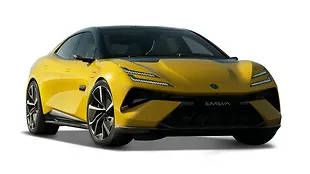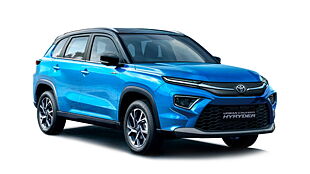Introduction

How many of us really know what happens at a car manufacturing unit? Let alone the core ideologies and initiatives undertaken by the car manufacturers for the betterment of the society. This past week, a bunch of media delegates, including me, got a one-of-a-kind opportunity to witness the world of Toyota Kirloskar Motor. Through a series of presentations and real-time enactment of the entire process, the manufacturer revealed all those behind-the-scene things that happen every day!
Here below is a gist of those presentations that were put forth during my visit –
Main Presentation
The main presentation started with a brief history of Toyota Kirloskar Motor Pvt. Ltd. It was incorporated in October 1997, with Toyota holding 89 per cent of the shares and Kirloskar owning 11 per cent. Soon after, Toyota's first factory was set up in Bidadi, Bengaluru which is spread across 432 acres. The group’s journey in India commenced in the year 2000 with the launch of the Qualis followed by the Corolla, Innova and the Fortuner in 2003, 2005 and 2009, respectively. Toyota Kirloskar Motor soon went on to produce the Etios in 2010, the Crysta and the new Fortuner in 2016 and the Yaris in 2018. Back in 2017 the group also introduced its luxury arm, Lexus, in India. As of May 2019, the company has 359 dealer facilities in the country and 77 dealer principals.

Moreover, the customer-first principle at Toyota has been passed down as a guiding principle since the company’s founding. It all began in 1930, when the company’s first production model, the G1 truck broke down and Kiichiro Toyoda, the founder of Toyota Motor himself along with Toyota's engineers rushed to see the customer and repair the truck. This customer-first principle is followed across every touch point, be it pre-sales, sales, after sales or re-purchase. What's more, at Toyota Trust, the customers can buy, sell or exchange a used car with verified documents.
Safety
Toyota cars in India are ASEAN NCAP certified with above four-star rating. Like in most car production facilities in the country, Toyota too has certain guidelines in place. To begin with, it is mandatory for all to wear a cap in the production area while the staff also needs to wear closed shoes. Additionally, mobile phone usage is prohibited while walking, using handrail in stairs is encouraged and the facility has green coloured walkways. Among all of these, the three-point finger check at all intersections was something that caught my attention. It encourages employees to stop and perform a three-point inspection before moving ahead. This activity might appear funny to many, but then, it is really helpful when you have to cross a busy road every day.

The importance of safe operation is evident at dealerships as well and Toyota regularly conducts training and awareness campaigns. The dealership is required to report all near-miss accidents or accidents using the accident reporting tool. The accidents will then be analysed and counter-measures will be implemented.
Environment

The Toyota service outlets in the country use organic materials for vehicle cleaning jobs, thereby reducing about 95 per cent of water consumption. The five per cent of water used for cleaning is also recycled and reused at the facility. The Toyota cars also use eco-friendly waterborne paints over the standard solvent-based paints used by other car manufacturers. The concept of Kaizen - Sino-Japanese word for ‘improvement’, refers to the continuous improvement of all functions and involve all employees from the CEO to the assembly line workers. This was worth appreciating at Toyota!
Manpower Excellence

I always believed people are the driving force behind every company and I was glad to see a similar thought process being followed at Toyota as well. Toyota Kirloskar Motor imparts special training to the talented youth at the Toyota Technical Training Institute, where the students undergo personality development and grooming for the service industry (dealership network). Interestingly, the institute focused on students having standardised handwriting, which in-turn will help them in faster operation at the production facility due to better coordination among the staff.

Q Service
Toyota offers a wide variety of service packages to its customers. The Smiles service value pack offers an affordable pre-paid maintenance package that can be purchased at any point of time (during new car purchase or afterwards). The package is available as per customer usage – low, medium, high and very high running. The Smiles service value pack is valid for a period of up to two years. To prevent customers from visitng unauthorized local workshop for injector repairs, the company workshops have been offering the injector repair and return service since June 2018.

Toyota will soon introduce the ‘Service Express’ vehicles – which is essentially a Toyota service centre on wheels. The ‘Service Express’ will be stationed at remote locations and is well equipped to conduct all types of periodic maintenance, general repair jobs, vehicle diagnosis, online repair order generation, eco-wash and minor car beautification services.
Toyota EDGE

Toyota EDGE offers value-added services in the customer life cycle with a comprehensive ownership solution for customers. This includes Toyota accessories, Toyota protect, extended warranty, Smiles service and Toyota financial services. Interestingly, customers can also customise their Toyota Edge Program as required. This includes a choice of vehicle, choice of accessories, Toyota protect three-year comprehensive plan options and choice of extended warranty plans as per usage pattern. Moreover, customers can also choose the Smile plan as per the usage pattern as well as finance options as per convenience. Customers also have the price advantage under the EDGE program.
Express Maintenance

Toyota Express maintenance is designed to conduct periodic maintenance jobs in just 60 minutes. Customers can book an appointment a day before the service due date for regular maintenance jobs. The service facility notifies the customer with the executive details who will work on the vehicle the next day. Once the vehicle is brought in for regular maintenance job, three technicians work on the vehicle simultaneously to deliver the vehicle in the promised time span of 60 minutes. For additional jobs to be carried outside the scope of regular maintenance, express maintenance will require 90 minutes or more depending on the nature of the job. On probing further, I learnt that express maintenance jobs are preferred by private vehicle owners, while the commercial fleet users prefer the regular service which allows them to rest at dedicated bunkers for commercial operators at the Toyota service facility. The commercial vehicle users in the bunker also have access to the bathroom for recreational purpose.
Tech Solutions

Toyota allows customers to view the model of their choice or compare it with other models via large touchscreens at the sales outlets. Moreover, the company has a centralised data application that records and monitors everyday operations at the service facility. The application has algorithms and logics which facilitates bookings of appointments as per customer request and availability. The tool also allows service advisors to confirm the delivery time to walk-in customers. Moreover, it also helps in effectively utilising the bays to ensure the least wait time for customers.

![Toyota Innova Crysta [2016-2020] Image Toyota Innova Crysta [2016-2020] Image](https://imgd.aeplcdn.com/272x153/n/cw/ec/20623/innova-crysta-exterior-right-front-three-quarter.jpeg?q=80)
![Toyota Innova Crysta [2016-2020] Right Front Three Quarter Toyota Innova Crysta [2016-2020] Right Front Three Quarter](https://imgd.aeplcdn.com/199x112/n/cw/ec/20623/innova-crysta-exterior-right-front-three-quarter.jpeg?q=80)
![Toyota Innova Crysta [2016-2020] Right Side View Toyota Innova Crysta [2016-2020] Right Side View](https://imgd.aeplcdn.com/199x112/n/cw/ec/20623/innova-crysta-exterior-right-side-view.jpeg?q=80)
![Toyota Innova Crysta [2016-2020] Right Rear Three Quarter Toyota Innova Crysta [2016-2020] Right Rear Three Quarter](https://imgd.aeplcdn.com/199x112/n/cw/ec/20623/innova-crysta-exterior-right-rear-three-quarter.jpeg?q=80)
![Toyota Innova Crysta [2016-2020] Dashboard Toyota Innova Crysta [2016-2020] Dashboard](https://imgd.aeplcdn.com/199x112/n/cw/ec/20623/innova-crysta-interior-dashboard.jpeg?q=80)
![Toyota Innova Crysta [2016-2020] Steering Wheel Toyota Innova Crysta [2016-2020] Steering Wheel](https://imgd.aeplcdn.com/468x263/n/cw/ec/20623/innova-crysta-interior-steering-wheel.jpeg?q=80)

























